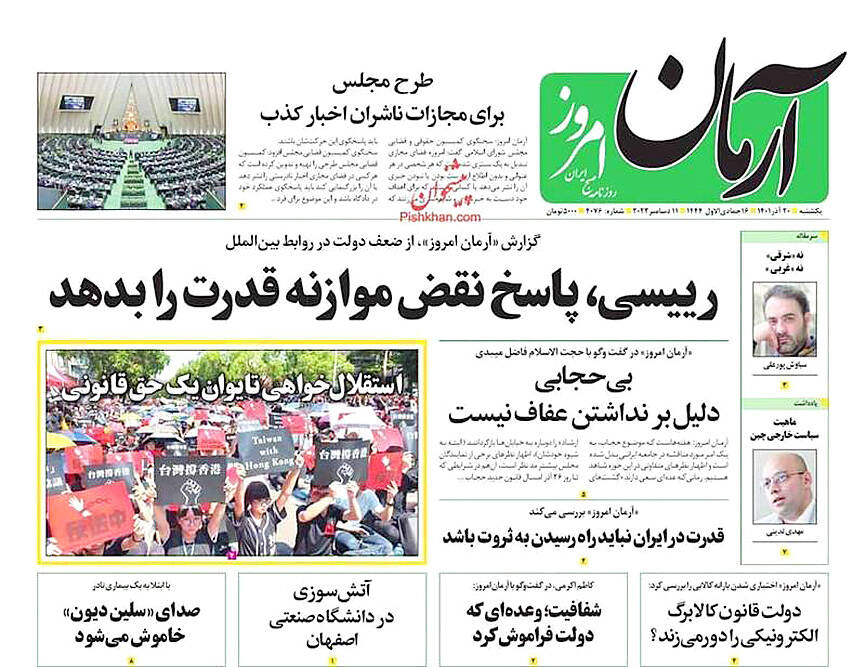An Iranian newspaper on Saturday said that Taiwan has a “legal right” to independence, in an apparent reaction to China siding with the United Arab Emirates (UAE) in a diplomatic row over three islands in the Strait of Hormuz that Iran also claims.
The Arman Daily’s front page story, titled “Taiwan Independence: A Legal Right,” said Beijing would have to accept Taiwan’s independence despite attempts to suppress it by force.
The article gained international attention after Iranian commentator Maysam Bizaer posted about it on Twitter.

Photo: screen grab from the Arman Daily Web site
It came after a joint statement of the 2022 China-Arab States Summit said that participants “affirmed their support for all peaceful efforts, including the initiative and endeavors of the United Arab Emirates ... to reach a peaceful solution to the issue of the three islands; Greater Tunb, Lesser Tunb, and Abu Musa, through bilateral negotiations in accordance with the rules of international law, and to resolve this issue in accordance with international legitimacy.”
The then-Imperial Iranian Navy seized the islands in November 1971 after the British Royal Navy stopped patrolling near them, sparking a decades-long territorial dispute between Iran and the UAE.
In Iran, the joint statement was widely perceived as a slight, drawing a diplomatic protest from Tehran and condemnations in the Iranian press.
Bizaer’s Twitter post cited several headlines in Iranian newspapers, including “China Against Iran,” “What’s China’s Plans for Middle East,” “The Chinese Shock” and “China’s Not-So-Friendly Message for Iran.”
Taiwanese online commentator Emmy Hu (胡采蘋) on Tuesday shared Bizaer’s tweet on Facebook, saying: “Something must have happened for us to win prizes while lying down.”
“All of this is because the Arabs laid claim to three of Iran’s islands and then China backed this claim by playing dumb to ingratiate itself with the Saudis, pissing off Iran,” she said, apparently confusing the UAE with Saudi Arabia.
“Kudos to Daddy Xi for making the world more and more pro Taiwanese independence,” she wrote, referring to Chinese President Xi Jinping (習近平).
Tehran viewed Beijing’s joint statement with the Arab states as “a betrayal,” Hu wrote in her post, which received 3,500 mostly positive responses from Facebook users.
“The boat of [Sino-Iranian] friendship sure capsized quick,” one comment read.
Meanwhile, Beijing on Tuesday sent Chinese Vice Premier Hu Chunhua (胡春華), who was recently removed from the top echelons of power, to meet Iranian President Ebrahim Raisi in a sign that Beijing is keeping its distance from the Middle Eastern nation as it deals with widespread unrest.
Hu told Iranian officials that China “will not waver in its determination to develop their comprehensive strategic partnership,” the official Xinhua news agency reported.
“China firmly supports Iran in opposing external interference and safeguarding its sovereignty, territorial integrity and national dignity,” it cited Hu as saying.
Additional reporting by Bloomberg

DAREDEVIL: Honnold said it had always been a dream of his to climb Taipei 101, while a Netflix producer said the skyscraper was ‘a real icon of this country’ US climber Alex Honnold yesterday took on Taiwan’s tallest building, becoming the first person to scale Taipei 101 without a rope, harness or safety net. Hundreds of spectators gathered at the base of the 101-story skyscraper to watch Honnold, 40, embark on his daredevil feat, which was also broadcast live on Netflix. Dressed in a red T-shirt and yellow custom-made climbing shoes, Honnold swiftly moved up the southeast face of the glass and steel building. At one point, he stepped onto a platform midway up to wave down at fans and onlookers who were taking photos. People watching from inside

A Vietnamese migrant worker yesterday won NT$12 million (US$379,627) on a Lunar New Year scratch card in Kaohsiung as part of Taiwan Lottery Co’s (台灣彩券) “NT$12 Million Grand Fortune” (1200萬大吉利) game. The man was the first top-prize winner of the new game launched on Jan. 6 to mark the Lunar New Year. Three Vietnamese migrant workers visited a Taiwan Lottery shop on Xinyue Street in Kaohsiung’s Gangshan District (崗山), a store representative said. The player bought multiple tickets and, after winning nothing, held the final lottery ticket in one hand and rubbed the store’s statue of the Maitreya Buddha’s belly with the other,

‘NATO-PLUS’: ‘Our strategic partners in the Indo-Pacific are facing increasing aggression by the Chinese Communist Party,’ US Representative Rob Wittman said The US House of Representatives on Monday released its version of the Consolidated Appropriations Act, which includes US$1.15 billion to support security cooperation with Taiwan. The omnibus act, covering US$1.2 trillion of spending, allocates US$1 billion for the Taiwan Security Cooperation Initiative, as well as US$150 million for the replacement of defense articles and reimbursement of defense services provided to Taiwan. The fund allocations were based on the US National Defense Authorization Act for fiscal 2026 that was passed by the US Congress last month and authorized up to US$1 billion to the US Defense Security Cooperation Agency in support of the

HIGH-TECH DEAL: Chipmakers that expand in the US would be able to import up to 2.5 times their new capacity with no extra tariffs during an approved construction period Taiwan aims to build a “democratic” high-tech supply chain with the US and form a strategic artificial intelligence (AI) partnership under the new tariffs deal it sealed with Washington last week, Taipei’s top negotiator in the talks said yesterday. US President Donald Trump has pushed Taiwan, a major producer of semiconductors which runs a large trade surplus with the US, to invest more in the US, specifically in chips that power AI. Under the terms of the long-negotiated deal, chipmakers such as Taiwan Semiconductor Manufacturing Co (TSMC, 台積電) that expand US production would incur a lower tariff on semiconductors or related manufacturing